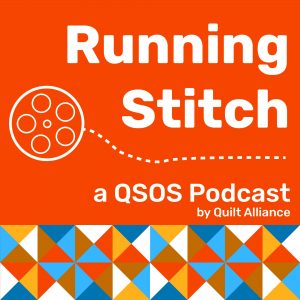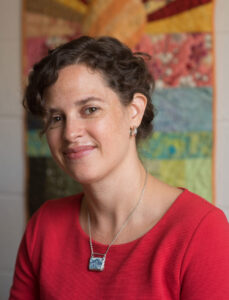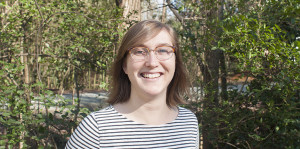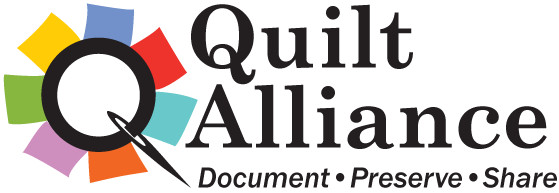 The Quilt Alliance released the third episode of Running Stitch, a QSOS Podcast this week. If you’re already a subscriber, then you know that the first three episodes focused on First Quilts with guest Victoria Findlay Wolfe, Quilts and Activism with Thomas Knauer, and Quilts and Difficult Times with Melanie Testa. Host Janneken Smucker selects audio clips from QSOS oral history interviews conducted between 1999-2017, and invites the interviewees back to talk about how their quilts and their lives have changed since they were last documented by project volunteers. With a collection of around 1,200 QSOS interviews, more than 600 Go Tell It! video recordings and 30 StoryBee interviews, the Alliance has an abundance of content to draw from, documentation that spans decades and includes quilters from almost every US state and representing most sub-genres of the quilting community.
The Quilt Alliance released the third episode of Running Stitch, a QSOS Podcast this week. If you’re already a subscriber, then you know that the first three episodes focused on First Quilts with guest Victoria Findlay Wolfe, Quilts and Activism with Thomas Knauer, and Quilts and Difficult Times with Melanie Testa. Host Janneken Smucker selects audio clips from QSOS oral history interviews conducted between 1999-2017, and invites the interviewees back to talk about how their quilts and their lives have changed since they were last documented by project volunteers. With a collection of around 1,200 QSOS interviews, more than 600 Go Tell It! video recordings and 30 StoryBee interviews, the Alliance has an abundance of content to draw from, documentation that spans decades and includes quilters from almost every US state and representing most sub-genres of the quilting community.
Janneken, a Professor of History at West Chester University, and Emma Parker, producer and QA Project Manager, set out to create a podcast in which quilts and quiltmaking serve as a lens to examine some of today’s most pressing issues, including activism, public health, politics, race, and the economy. Janneken uses storyboarding to sketch out each episode, schedules and conducts the interviews, and records narrative, transition and credit segments. Emma uses the storyboard to retrieve clips, edits the episode together, and builds the episode webpages.
The podcast was made possible by our partners at the Louie B. Nunn Center for Oral History who recently completed the digitization of over 800 audio cassettes, the media of choice when QSOS was launched. In addition to digital audio, each interview is indexed with summaries, keywords and links. This important work, underwritten by individuals and businesses and a generous grant from the Robert and Ardis James Foundation, makes the collection infinitely more accessible and searchable for users.
I have been fascinated by Janneken and Emma’s thorough and artful approach to working on Running Stitch and decided to turn the interview roles around and ask them a few questions about their work and their own podcast favorites.

Janneken Smucker
Janneken
Q: You’ve been involved with the QA and the QSOS project since 2005 when you joined the QA board. Has doing this podcast changed your opinion about the value or utility of the QSOS collection to users?
A: Working on Running Stitch reveals the depth and breadth of the QSOS collection. Now that we can search across interviews, thanks to the technology updates feasible through digitizing the collection and indexing it in OHMS (Oral History Metadata Synchronizer), we can discover hidden moments in interviews and find ways to put the interviews in conversation with one another. And as the episodes so far reveal, the interviews are extremely relevant to contemporary concerns that resonate well beyond quiltmaking. Running Stitch explores how quilts and quiltmaking relate to larger cultural issues, and this is only possible because of our archive of oral histories.
Q: What are some of your favorite podcasts?
A: I listen to way too many news and politics podcasts to get my fix of current events coverage, but in terms of more cultural fare, I recommend Wind of Change, which explores the rumor that the CIA wrote the song of that title which was a hit by the Scorpions, and proved pivotal in the waning years of the Cold War. I also like Slow Burn, produced by Slate, which used archival audio including oral histories as well as new interviews to explore historical topics, including Watergate and the Clinton impeachment. Similarly, Last Seen, produced by WBUR and the Boston Globe drew on historical and archival content to explore the unsolved art heist from the Isabella Stewart Gardener Museum.

Emma Parker
Emma
Q: Your training is in folklore, and in your job with the QA, you are producing this podcast, as well as audio oral history and video storytelling projects. Do you have a preference for either audio or video as a storytelling medium when it comes to quilts?
A: That’s such a hard question! I think both audio and video have so much to offer, but in different ways. Because quilt stories often have at their heart an actual quilt, I always love to be able to see the quilt and hear someone talk about it at the same time. The interaction we get in Go Tell It at the Quilt Show videos between the “teller” and the quilt makes those videos especially powerful! I often get a special understanding of how someone feels about a quilt by the way they hold it as they talk, or how they turn all the way around to point out that one piece of appliqué they’re most proud of.
That said, there’s something really special about hearing someone’s voice. I’m always surprised by just how much comes through an audio recording, whether it’s a just-a-little-bit-longer pause or a nervous giggle that suggests what’s not being said. Some of our QSOS interviews really do feel like you’re in the room with the interviewer, or on the quilt show floor where that story was recorded and I love that audio recordings let you imagine what was going on on the other side of the tape.
Q: And what are some of your favorite podcasts?
A: I have to admit that my podcast consumption has fallen off quite a bit now that my big daily commute for work is from the back of the house to the front! As you mentioned, I have an educational background in folklore and linguistics, so I find myself drawn to podcasts that investigate the quirks of everyday life and language. Three of my favorites in that genre are 99% Invisible, Every Little Thing, and Lexicon Valley. Recently covered topics include a deep dive on the design of the classic American mailbox with a flag, how they decided on the typeface on highway exit signs and an exhaustive history of the word ‘y’all’. I love this stuff!
I think Running Stitch listeners might especially like a short podcast mini-series called Articles of Interest, which focuses on the history of clothing, including a whole episode about pockets. And of course, if you’re not listening to Quilt Alliance board president Frances O’Roark Dowell’s QuiltFiction and Off-Kilter Quilt podcasts, hop on those!
Subscribe to Running Stitch, a QSOS Podcast at: Apple Podcasts – Spotify – Google Podcasts – Stitcher
